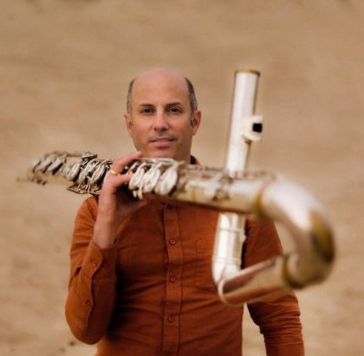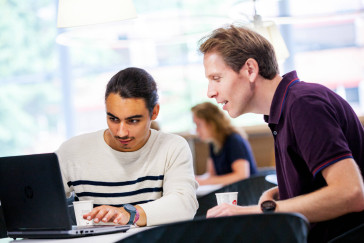Poster presented at EFYE 2018. Strengthening the wellbeing of students is an increasingly important approach of the development of students’ social, emotional and academic skills. Personal wellbeing motivates, among other things, students to learn and increases academic involvement and performance accordingly (Noble et al., 2008). According to the Centre for Education of Statistics and Evaluation (CESE, 2015) the educational welfare of students is also important for another reason; the recognition that teaching is not just about achieving academic performance, but also about the welfare of the student as a whole (intellectual, physical, social, emotional, moral and spiritual). Recent studies indicate that more and more students suffer from (mental) health problems (LSvB 2013, 2017; Schaufeli et al., 2002). The aim of the Student Wellbeing Project at Inholland University of Applied Sciences is to 1) investigate the state of student wellbeing in Dutch higher education and investigate the factors that influence wellbeing, 2) explore and offer best practices to improve student wellbeing (curative and preventive) 3) establish a strong (international) partnership and collaborate to improve student wellbeing.
DOCUMENT

We use a randomised experiment to study the effect of offering half of 556 freshman students a learning analytics dashboard and a weekly email with a link to their dashboard, on student behaviour in the online environment and final exam performance. The dashboard shows their online progress in the learning management systems, their predicted chance of passing, their predicted grade and their online intermediate performance compared with the total cohort. The email with dashboard access, as well as dashboard use, has positive effects on student behaviour in the online environment, but no effects are found on student performance in the final exam of the programming course. However, we do find differential effects by specialisation and student characteristics.
MULTIFILE

Research conducted by the Research Group Study Success indicates that many students experience performance pressure. In addition, we’ve noticed an increase in performance pressure in recent years. A little bit of performance pressure can be a good thing: it can facilitate concentration or hitting your deadlines. Are you feeling pressured over extensive periods of time, or are you experiencing stress, lack of sleep, or decreased concentration due to concerns about delivering on performance? Then it is probably a good plan to spring into action. With this info sheet we will explain what performance pressure entails, what causes it, and we will offer suggestions on how to handle performance pressure.
DOCUMENT

Students in Higher Music Education (HME) are not facilitated to develop both their artistic and academic musical competences. Conservatoires (professional education, or ‘HBO’) traditionally foster the development of musical craftsmanship, while university musicology departments (academic education, or ‘WO’) promote broader perspectives on music’s place in society. All the while, music professionals are increasingly required to combine musical and scholarly knowledge. Indeed, musicianship is more than performance, and musicology more than reflection—a robust musical practice requires people who are versed in both domains. It’s time our education mirrors this blended profession. This proposal entails collaborative projects between a conservatory and a university in two cities where musical performance and musicology equally thrive: Amsterdam (Conservatory and University of Amsterdam) and Utrecht (HKU Utrechts Conservatorium and Utrecht University). Each project will pilot a joint program of study, combining existing modules with newly developed ones. The feasibility of joint degrees will be explored: a combined bachelor’s degree in Amsterdam; and a combined master’s degree in Utrecht. The full innovation process will be translated to a transferable infrastructural model. For 125 students it will fuse praxis-based musical knowledge and skills, practice-led research and academic training. Beyond this, the partners will also use the Comenius funds as a springboard for collaboration between the two cities to enrich their respective BA and MA programs. In the end, the programme will diversify the educational possibilities for students of music in the Netherlands, and thereby increase their professional opportunities in today’s job market.

Studenten in het beroepsonderwijs leren op de werkplek om een goede beroepsuitoefenaar te worden. Beoordeling van het werkplekleren gebeurt vaak op de werkplek en door de werkplek. Dit promotieonderzoek wil in kaart brengen hoe werkplekopleiders de student beoordelen.

Due to their diverse funding sources, theatres are under increasing pressure to demonstrate impact on society. The Raad voor Cultuur (2023) for example advised the secretary of state to include societal impact as an additional evaluation measure next to artistic value. Many theaters, such as the Chassé Theater and Parkstad Limburg Theaters, have reformulated their missions to focus on impact of performances on visitors. This is a profound transformation from merely selling tickets and filling seats, and requires new measurement instruments to monitor, manage, and improve impact. Currently available instruments are insufficient, and effective monitoring is crucial to larger future projects that theaters are currently planning to systematically broaden impacts of performances on their communities. The specific goal of this project is to empower theaters to monitor and improve impact by developing a brief experience impact questionnaire, taking existing data from student projects conducted at the Chassé Theater about performing arts experiences on one hand, and experience impact theory innovations on the other, as starting points. We will develop potential items to measure and benchmark against established measures of valued societal outcomes, such as subjective well-being and quality of life. These will be measured in questionnaires developed with project partners Chassé Theater and Parkstad Limburg Theaters and administered before and after performances across a wide range of genres. The resulting data will enable comparison of new questionnaire items with benchmarked measures of valued societal outcomes. The final product of the project will be a brief impact questionnaire, which within several brief self-report instruments and just a few minutes can effectively be used to quantify the impact of a performing arts experience. A workshop and practice-oriented article will make this questionnaire implementable, thereby mobilizing the key enabling methodology of monitoring and impact measurement in the performing arts sector.